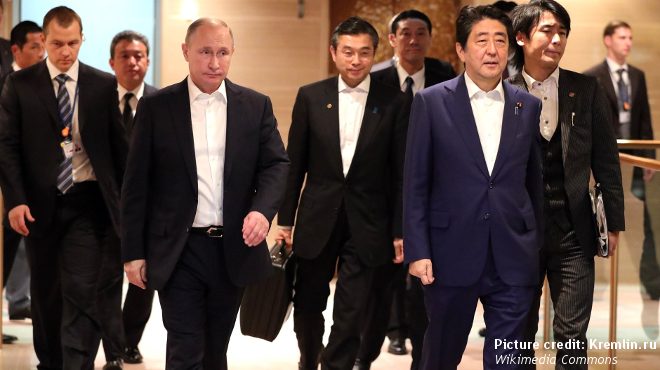Testing the Waters: Japan’s rapprochement with Russia

In two weeks time, Prime Minister Shinzo Abe and President Vladimir Putin will convene their fourth meeting this year alone. The meeting will take place during the 2017 APEC summit in Vietnam.
The frequency of their meetings is significant. Russia-Japan relations turned cold in 2014 when Japan, along with the G7, sanctioned Russia after its annexation of Crimea.
Since then, bilateral relations have experienced something of a revival, evidenced in the signing of numerous trade and energy deals and an apparent eagerness to solve the longstanding island dispute over the Kuril Islands/Northern Territories.
However, while these improvements are compelling and have alarmed some G7 members, Japan nonetheless will remain firmly within the pro-America camp.
Japanese Economic Interests
Over the last two years, Russo-Japanese cooperation has culminated in four major deals between the two countries.
Firstly, Abe’s May 2016 meeting with Putin in Sochi resulted in declaring Japan’s ‘New Approach’ to Russia; an 8-point plan of economic cooperation in energy, transportation, agriculture, technology, healthcare, urban infrastructure, and small/medium enterprises. This was followed up in April, 2017 when Abe visited Moscow and signed a variety of agreements on trade, economics, sports, education, science, and tourism.
Secondly, in December 2016 Japan and Russia concluded agreements to engage in joint-economic activities on the disputed Kuril Islands/Northern Territories under a special legal framework.
Thirdly, the start of 2017 saw the visa system between Japan and Russia simplified. This signaled a desire to return to pre-2014 cooperation with Russia, given that the suspension of visa negotiations were a key part of Japan’s sanctions.
Finally, last year, Japan’s Bank for International Cooperation closed an agreement providing funds for Russia’s Yamal Liquefied Natural Gas (LNG) project run by Novatek, the country’s largest natural gas producer. As the world’s largest importer of LNG, Japan is keenly interested in having a stake in the project.
Whilst these developments clearly indicate Japan-Russia relations are surging, Japan’s trade with the US and neighboring countries are far more important.
According to 2016 figures, Japanese exports to the USA are valued at $130bn or 22% of exports. This is followed by China, South Korea, Hong Kong, and Thailand. Moreover, Japan’s top import origins are China, followed by the USA, South Korea, Germany, and Australia. In contrast, exports to Russia are valued at $1.5bn to (0.84%) and imports at 11.3bn (1.9%).
Thus, despite these increases in cooperation with Russia, the US is far more influential on Japan’s economic and geopolitical future.
G7: Divergent Interests
Abe’s 2016 meeting with Putin was widely interpreted as Japan backing away from the G7’s sanctions against Russia. President Obama was even reported to have phoned Abe in order to dissuade him from meeting with the Russian President.
However, while Japan clearly desires good relations with Russia, further bilateral improvements are dependent on larger geopolitical factors, and increasingly, Tokyo’s connections with Moscow will come under pressure.
For example, a proposed deal between the Russian firm Rosneft and Japanese firms Japan Oil, Gas, Metals National Corps, and Marubeni Corps was abandoned after the US objected to the deal. Japan was reminded of the G7 principle that no country should ‘backfill’ sanctions by allowing their companies to cooperate on projects which American companies are prohibited from.
Indeed, the US continues to weild great influence on Japan as the guarantor of its security and its biggest ally. Japan’s PAC-3 and SM-3 Aegis Interceptor anti-missile defense systems were provided by the US. Further, Japan’s Self Defense Forces (SDF) routinely take part in military exercises with the US military in the Sea of Japan and, in more recent years, beyond Japanese waters.
When it comes to the DPRK, Abe has expressed strong support for President Trump’s hard line, and President Trump reportedly told his Japanese counterpart that, ‘Japan and America are 100 percent together and there is no room to doubt the Japan-US alliance’.
Thus, the US plays a far greater role in Japan’s strategic interests than Russia.
A Balancing Act
Over the past few years, Japan has been testing the boundaries of its international commitments vis-à-vis rapprochement with Russia.
Russia is interested in weakening the G7 resolve against it and will exploit potential fissures in the US-Japan alliance, such as making progress over the Kuril Islands/Northern Territories dispute dependent on Japan distancing itself from the United States. However, these attempts are unlikely to be successful.
Even given Abe’s recent election victory and his desire to revise Japan’s pacifist constitution, this will not necessarily disrupt the alliance structure. Indeed, the US will continue to be the cornerstone of Japan’s security policy and its biggest ally.
Although that will not stop Tokyo from pursuing improvements with Russia in the spheres of trade, energy, and diplomacy, recent history shows that when forced to choose, Japan will uphold its G7 commitments.
We can expect the status quo to remain with Japan extracting the maximum it can from its relationship with Russia, whilst ensuring the US is kept onside.